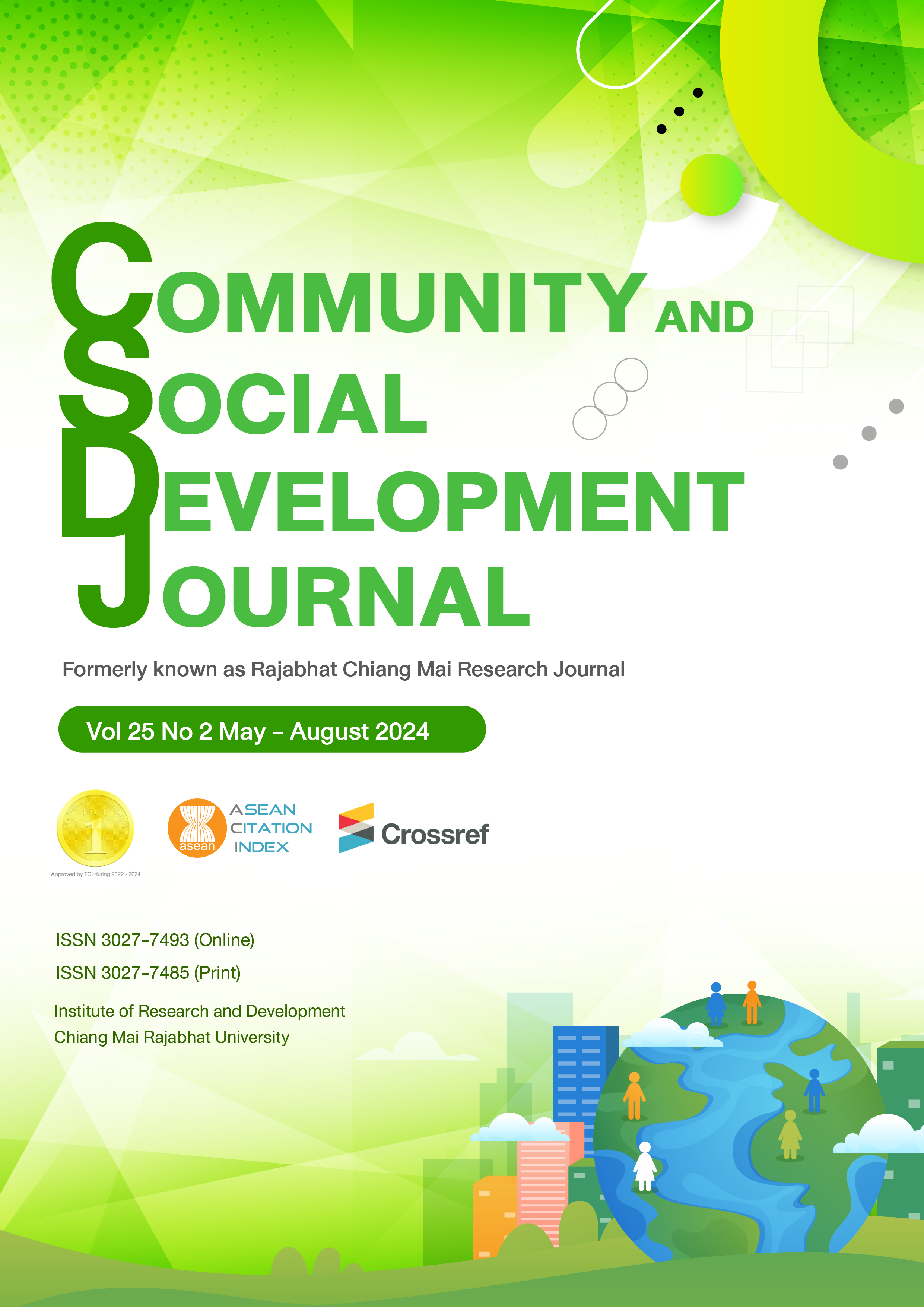Development of Management Guidelines of Inclusive Education in Special Education Center, Petchabun Province
DOI:
https://doi.org/10.57260/csdj.2024.268040คำสำคัญ:
Composition and indicators, Current condition, Desirable condition, Inclusive education management guidelines, Special education centers phetchabun provinceบทคัดย่อ
In order to send children with special needs into inclusive education, the objectives are to 1) examine the components and indicators in inclusive education for educational institutions at the Phetchabun Special Education Center, 2) current conditions and desired conditions in providing inclusive education for educational institutions at the Phetchabun Province Special Education Center, and 3)developing guidelines for organizing inclusive education for educational institutions at the Phetchabun Province Special Education Center. The sample groups used in this study were personnel of the Phetchabun Provincial Special Education Center, including 3 school administrators, and 33 teachers, totaling 36 people in the sample. However, the sample size was determined according to the table of Krejcie & Morgan (1970), and the stratified random sampling technique was used, which used location as the random unit. This research is research and development, a questionnaire on the existing and ideal circumstances of inclusive education for special education centers in Phetchabun Province, as well as a form to evaluate the suitability of the components and indicators of inclusive education, are among the tools used for data collecting. According to the study's findings, the Phetchabun Provincial Special Education Center's guidelines for organizing inclusive education for educational institutions have a significant impact on the development of inclusive education formats. These recommendations cover the elements and indicators, as well as the intended and actual circumstances as well as inclusive education organizations. It has a policy to provide educational services to children with special needs who need education in the form of inclusive learning in order to expand their educational opportunities. The information obtained can then be used as information in planning education for children with special needs, as well as a guideline for organizing education for children with special needs to be carried out efficiently, in accordance with the guidelines for cooperation in providing education for persons with special needs as per the policies of the Ministry of Education.
Downloads
เอกสารอ้างอิง
Achinsamacharn, C. (2020). Educational administration. Bangkok: Pimdee Co., Ltd.
Cameron, J. (2005). A collective case study: how regular teachers provides inclusive education for severely and profoundly deaf students in regular schools in rural new south wales. (Thesis for the Degree of Doctor of Philosophy in Education, University of Newcastle).
Chinchai, S. (2008). Development of an inclusive learning management model for children with special needs: A case study of a co-educational school in Chiang Mai Province. (Doctor of Science in applied behavioral science research, Graduate school, Srinakharinwirot University).
Chonthanon, B. (2003). Inclusive education. Teaching materials for inclusive education courses. Bangkok: Suan Dusit Rajabhat Institute.
Dhedchawanagon, K. (2023). Development of bilingual teaching models according to multicultural education approaches using english and ethnicity language. Rajabhat Chiang Mai Research Journal, 24(2), 32–55. Retrieved from https://so05.tci-thaijo.org/index.php/cmruresearch/article/view/263046
Garry, H., & Chrystal, W. (2010). Parent involvement in inclusive primary school in New Zealand: Implications for improving practice and for teacher education. Canterbury, New Zealand: University of Canterbury.
Krejcie, R. V., & Morgan, D. W. (1970). Determining sample size for research activities. Educational and Psychological Measurement, 30(3), 607-610. Retrieved from https://doi.org/10.1177/001316447003000308
Nonthikorn, C. (2009). Improving academic achievement. Bangkok: Foundation for the Learning Research and Development Institute.
Phayomyam, R. (2011). Studied the management of schools leading inclusive education for Disabled children in regular schools. (Master's degree thesis, Silpakorn University).
Reynolds, M., & Birch, J. (1977). Teaching exceptional children in all America’s school. Virgenia: The Council for Exceptional Children.
Srisa-at, B. (2010). Basics of educational research. Kalasin: Prasarn Publishing.
Uttayotha, S. (2013). Development of a collaborative network model of community organizations for inclusive learning for learners with special needs. (Dissertation, Doctor of Philosophy Program, Field of study: Educational Leadership and Human Resource Development. Graduate school, Chiang Mai Rajabhat University).
Uthairattanakit, D. (2015). Education for people with disabilities in the era of globalization. Bangkok: Academic Quality Development Institute.
ดาวน์โหลด
เผยแพร่แล้ว
รูปแบบการอ้างอิง
ฉบับ
ประเภทบทความ
สัญญาอนุญาต
ลิขสิทธิ์ (c) 2024 Community and Social Development Journal

อนุญาตภายใต้เงื่อนไข Creative Commons Attribution-NonCommercial-NoDerivatives 4.0 International License.
1. บทความ ข้อมูล เนื้อหา รูปภาพ ฯลฯ ที่ได้รับการตีพิมพ์ใน “Community and Social Development Journal” ถือเป็นลิขสิทธิ์ของ Community and Social Development Journal มหาวิทยาลัยราชภัฏเชียงใหม่ และเพื่อให้เผยแพร่บทความได้อย่างเหมาะสมผ่านสื่อสิ่งพิมพ์และอิเล็กทรอนิกส์ ผู้เขียนยังคงถือครองลิขสิทธิ์บทความที่ตีพิมพ์ภายใต้ใบอนุญาต Creative Commons Attribution (CC BY) ซึ่งอนุญาตให้เผยแพร่บทความซ้ำในแหล่งอื่นได้ โดยอ้างอิงต้องอ้งอิงบทความในวารสาร ผู้เขียนต้องรับผิดชอบในการขออนุญาตผลิตซ้ำเนื้อหาที่มีลิขสิทธิ์จากแหล่งอื่น
2. เนื้อหาบทความที่ปรากฏในวารสารเป็นความรับผิดชอบของผู้เขียนบทความโดยตรง ซึ่งกองบรรณาธิการวารสารไม่จำเป็นต้องเห็นด้วยหรือร่วมรับผิดชอบใดๆ














